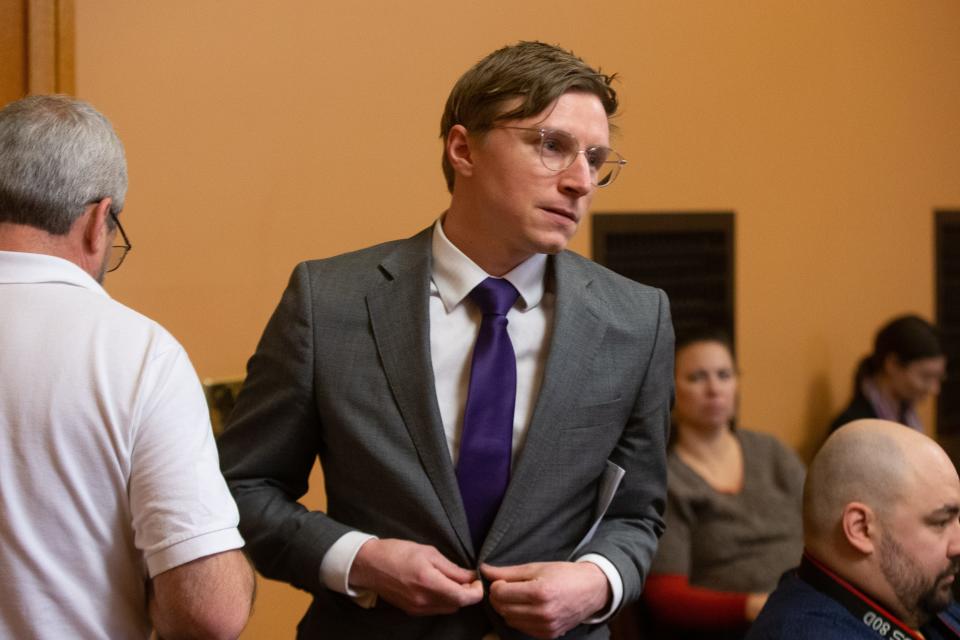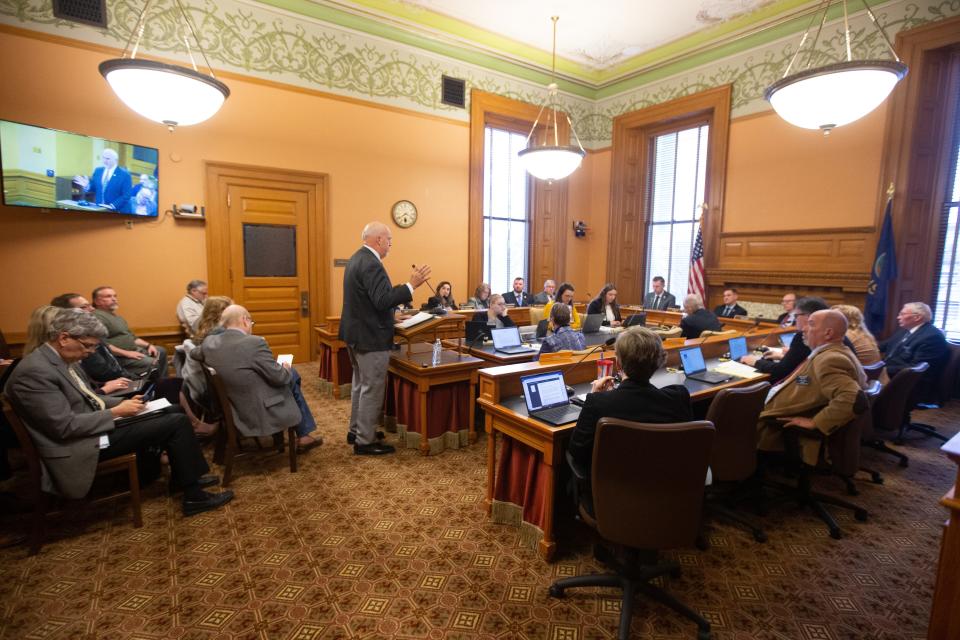Double the elections, double the fun? Kansas weighs a move toward runoff elections
- Oops!Something went wrong.Please try again later.
- Oops!Something went wrong.Please try again later.
- Oops!Something went wrong.Please try again later.
- Oops!Something went wrong.Please try again later.
- Oops!Something went wrong.Please try again later.
After a razor-thin governor's race involving third-party candidates, some Republicans are pushing for the state to move toward a different model where a runoff election is triggered if a winner doesn't get a majority of voters in their corner.
Proponents of the bill insist that the much maligned candidacy of Sen. Dennis Pyle, I-Hiawatha, who conservatives say threw the election to Democratic Gov. Laura Kelly rather than Republican Derek Schmidt, is not the reason for the bill.
But the measure would take aim at exactly those types of situations, requiring an election between the top two vote-getters a month after the general election if no candidate gets a majority of all votes cast. It would apply not just to the governor's race, but to all statewide elections in the state.
This would put Kansas in select company. Only Georgia and Louisiana conduct general election runoffs, though an additional nine states use the practice in primary elections.
But other states are considering a move away from runoffs. Georgia Secretary of State Brad Raffensberger, a Republican, called on legislators to nix the setup, saying it is a burden on counties and that residents do not want to be "dealing with politics in the middle of their family holiday."
These same factors trouble critics in Kansas as well.
"This just really seems like the wrong direction, where you’re going to wind up choosing statewide candidates that way fewer Kansans wind up voting for," Davis Hammet, executive director of the voter engagement group Loud Light, told the House Elections Committee on Tuesday.
Proponents say runoffs would ensure winners have mandate from voters

But Rep. Les Mason, R-McPherson, who introduced the legislation, said the change would ensure the ultimate election winner would be someone who garnered majority support. He was the only proponent to testify in support of the bill at a hearing Tuesday.
"It'd be best for Kansans, in general, to have that confidence that the person that's installed in that office has the support of the majority of the of the voters," Mason said in an interview. "And I also think that anyone who is installed in that office would like to have that mandate. You know, it's kind of hard to claim a mandate when you get 48% or 47% of the vote."
Three of the past four governor's races would have gone to a runoff under the bill, including Kelly's victories in 2018 and 2022.
Mason argued the proposal would not necessarily privilege Republicans, pointing to the high-profile runoff election for a U.S. Senate seat in Georgia earlier this year, where Republican Herschel Walker saw a negligible improvement in his vote share during the runoff. Walker was ultimately defeated by Democrat Raphael Warnock.
And Rep. Paul Waggoner, R-Hutchinson, said runoffs could encourage candidates to try and appeal to a broader swath of voters.
"Perhaps this proposal would force candidates to do proposals that would appeal to an absolute majority, rather than a plurality that gets them into the office they seek?" Waggoner said.
Still, others have expressed skepticism at the utility of runoff elections at a time when an Atlanta Journal-Constitution poll found that 58% of Georgia voters want to move away from runoff elections. Roughly 300,000 fewer voters turned out in the most recent runoff, compared with the general election.

But Mason said his goal was to prevent outside groups from backing a third-party candidate in a bid to derail the results of the election.
"I think some of these organizations will say, what's the point?" he said.
Republicans argue Pyle drew support from Democrat-aligned groups, seeking to amplify his conservative campaign planks in a bid to draw hard-right voters away from Schmidt.
American Center, a Washington-based group that shares the same address as a prominent law firm that frequently represents the Democratic National Committee, bought radio ad time and mailers in support of Pyle.
For his part, Pyle said he believed the bill was a clear response to his candidacy and that he would likely oppose any move to a runoff.
"If it is good for a general, it ought to be a good for the primary," he said in an interview. "Let's call a bluff. If it is not just about this race that took place (in 2022). And why not after the 2018 race? That's a question I would have for those House folks: Why now?"
More:Independent Kansas governor candidate Dennis Pyle hits airwaves — with help from Democrats
Runoffs could increase costs and flummox local election officials
But a dramatic change in voting systems could have a major impact on local election officials, who would effectively be asked to run another major elections just weeks after certifying the November general election.
Under the terms of the bill, a runoff election in 2022 would have occurred on Dec. 6. But the state Board of Canvassers did not meet to certify the results of the November election until Dec. 1, with many counties certifying their results a week or more after the Nov. 8 vote.
Estimates from Budget Director Adam Proffitt, show the bill could cost counties between $5 million and $6 million, as they would need to program voting machines, hire temporary elections staff and rent polling places. Unless the state reimbursed those costs, that would be funded by county taxpayers.
Secretary of State Scott Schwab's office is officially neutral on the bill, but Clay Barker, deputy assistant secretary of state, noted the bill would violate current statute, including federal laws, governing when ballots are sent to military and overseas voters.
Still, Barker cautioned there might be an "immense logistical burden that could be placed on the counties" as they may also struggle to meet other statutory deadlines or even secure polling places in churches during the busy holiday season.
"There would be a lot more than this short little bill if you were to really make it work," Harvey County Clerk Rick Piepho said.
Ranked-choice voting an option that wouldn't lengthen election season
Some have instead suggested lawmakers examine ranked-choice voting, where voters rank candidates in order of preference on their ballots.
If no candidate receives a majority of votes on the first ballot, the individual with the fewest first-place votes is eliminated and their support goes to the candidate voters listed second on their ballot. The process continues until someone receives a majority of all votes.
Alaska and Maine employ a ranked-choice voting system for statewide elections, while another 10 states use ranked-choice voting at the local level.
Proponents argue such a system will strengthen the voice of third-party candidates, while runoffs would water down the impact of those campaigns.
And Elaine Stephen, co-leader of Rank the Vote Kansas, asked lawmakers to consider whether lawmakers really wanted to prolong election season.
Chiefs games and other holiday programming, she said, would soon be interrupted by a stream of political advertising and debates.
"That should really make your Thanksgiving dinner fun," Stephen said.
This article originally appeared on Topeka Capital-Journal: After governor's race controversy, Kansas may move to runoff elections

